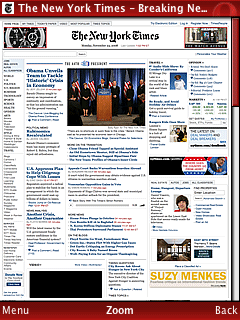Although it is difficult to get data on the relative sizes of the mobile web versus the Internet as people access it from their desktop PCs, it seems likely that the mobile web will outstrip the regular Internet, if it has not done so already. The relative costs of a smart phone or mobile device is a strong inducement and it is extremely handy to be able to stay in touch when you are on the go. In some parts of the world the mobile web will be the only way individuals can be online. The arguments are even stronger for the under 30 crowd, which some have labeled the digital natives.

An indicator of the rapid growth can be seen in the news from Opera which is seeing explosive growth in the use of Opera Mini, a browser specifically for mobile devices with their smaller screens. They suggest that Opera Mini is the quick, easy and secure way to get any Web page you want.
Number of Users
In September 2008, Opera Mini was used by approximately 19 million users, a 10.1% month-on-month increase from August 2008 and more than 341% compared to September 2007
If a business depends on sales or leads from the Internet, then it certainly should not neglect its visibility on the mobile web and how it will appear to visitors. This is particularly true for local search, where people may well use their smart phone as an aid in finding stores or service providers close to them. The importance of this sector should be obvious, but it is certainly confirmed by the efforts being put in by the major search engines.
Local Search
Microsoft and Google are the ones making the running here. Indeed Search On The Go is a slogan that has been adopted by Microsoft.
Shop and search on the go
We’ve just released the latest updates to our browser-based mobile search at m.live.com. One of our major efforts was to bring the power of product search to the convenience of a mobile phone. Think about how much time people spend shopping in brick-and-mortar stores — without the ability to do the product research they’re accustomed to from their PCs. We took the great product search features from Live Search and made them easy to use on your mobile phone.
Google is not to be outdone here and has brought out some major innovations for mobile devices. You can upgrade your mobile device with free Google products, such as Search, Maps, Gmail, YouTube and other Google products almost whatever the make. You can even identify the location where you happen to be. As an indicator of things to come, it is also possible to get a street view with your Nokia S60.

This will be made much more powerful when voice technology is added. GOOG-411 is currently available for free from Google as an indicator of things to come. Microsoft offers TellMe which is an equally attractive option.
Clearly this online space cannot be neglected. The launch of the iPhone prompts many to say that Mobile Local Search Has Finally Arrived.
This should all serve to drag mobile search out of the early adopter phase where it has been stuck for years. Through this, mobile search volume should increase; advertiser interest will follow; and more pervasive ad networks and mobile marketing firms will develop.
An Effective Mobile Web Presence
All websites will be seen to a greater or lesser extent on the mobile web. One indicator of how they appear can be obtained by using the Opera browser and using its Small Screen option. This may suggest that the user will have a satisfying experience or may indicate major viewing problems. However even if the view seems satisfactory, the result should be treated with a great deal of caution. Opera has some very sophisticated software to optimize the appearance. One cannot be sure that all of the multiplicity of mobile devices being used by the population at large will be equally effective.
The issues involved in developing an effective mobile web presence are complex. An excellent review of the issues in doing this is covered in an article by Opera on Designing pages to work on all devices, and small mobile ones in particular.
In considering choices here, a document from the World Wide Web Consortium is useful: it is titled Mobile Web Best Practices 1.0. That includes the following:
One Web
The recommendations in this document are intended to improve the experience of the Web on mobile devices. While the recommendations are not specifically addressed at the desktop browsing experience, it must be understood that they are made in the context of wishing to work towards “One Web”. One Web means making, as far as is reasonable, the same information and services available to users irrespective of the device they are using. However, it does not mean that exactly the same information is available in exactly the same representation across all devices.
One might assume that this implies the same website should be viewable in all devices. If so, to modify how the pages are displayed, a process for mobile device detection is needed.
Mobile Device Detection
Chris Mills has a good article on how to serve the right content to mobile devices. He discusses four topics that may come into play.
- Browser sniffing
- Creating a separate site for mobile browsers
- Media types
- Media queries
The bottom line on all this is that there are no easy solutions. Cameron Moll brings a similar viewpoint in his post on tips and techniques for mobile web design.
I believe the most robust solution is to consider a separate site for mobile browsers. Just a small example will illustrate the thinking involved. Here is the Google mobile search page.

Even though their desktop search page is incredibly simple and has lasted through the years, they did not attempt to reproduce it on the mobile web.
Web pages often are not well designed from a usability point of view even at the desktop level. With the much smaller screen real estate available on a mobile device screen, the way to interact with the web page should be reconsidered from scratch. In this way the best possible user experience can be delivered to any visitor, thus avoiding frustration and difficult scrolling or keyboarding.
Developing a separate mobile web presence has many advantages. Not least it can be designed to accommodate as many as possible of the mobile devices in use. It does require extra effort to maintain two separate web presences. However the mobile website is a very much reduced version of the full desktop website and should not present too many difficulties.
The key disadvantage is that the mobile version is not necessarily easily linked to its desktop equivalent. For example this would require that favorites on the mobile device would somehow be accessible on the desktop PC and vice versa. Since Sync-ing even contacts and appointments from desktops to Blackberries or iPhones is a challenge, Sync-ing favorites seems unlikely to be implemented.
Linking the Mobile Website with the Desktop equivalent
Perhaps the best solution on this Sync-ing question is to develop a strong brand presence. If a search for the brand on either the desktop PC or the mobile device highlights the same online presence, then this is the most powerful way of linking the two online worlds. After all as search technology develops to include speech technology, this will become the prime input method for the mobile device. Just as Google’s Chrome browser is pushing people towards search rather than using URLs, the voice enabled mobile device will be moving in the same direction.
Conclusion
The mobile web offers huge potential to online businesses. The question therefore is not whether to have a mobile website but rather how quickly. Choosing a very simple website structure and design will achieve most of the benefits and provide a robust solution.







Having a mobile version of a website is going to be a MUST in the next few months.
Having a mobile version of a website is going to be a MUST in the next few months.
Being a website developer, I have to say mobility is becoming more and more in demand by many of my clients. In fact, my company is working on an iPhone app that will allow property management companies to store vendor and renter information on it. While this mobility may mean more work for people-being able to work away from a desk-it is only to keep growing. Interestingly, the U.S. is behind other countries that have been developing mobile software for quite a while; I even saw a story about a year ago that mentioned how desktops and laptops in Japan are becoming more and more obsolete because of the use of the internt on cell phones. It will be interesting to see where technology goes in the coming year.
Being a website developer, I have to say mobility is becoming more and more in demand by many of my clients. In fact, my company is working on an iPhone app that will allow property management companies to store vendor and renter information on it. While this mobility may mean more work for people-being able to work away from a desk-it is only to keep growing. Interestingly, the U.S. is behind other countries that have been developing mobile software for quite a while; I even saw a story about a year ago that mentioned how desktops and laptops in Japan are becoming more and more obsolete because of the use of the internt on cell phones. It will be interesting to see where technology goes in the coming year.
My all time favourite of the 2nd Symphony is conducted by Simon Rattle.
My all time favourite of the 2nd Symphony is conducted by Simon Rattle.